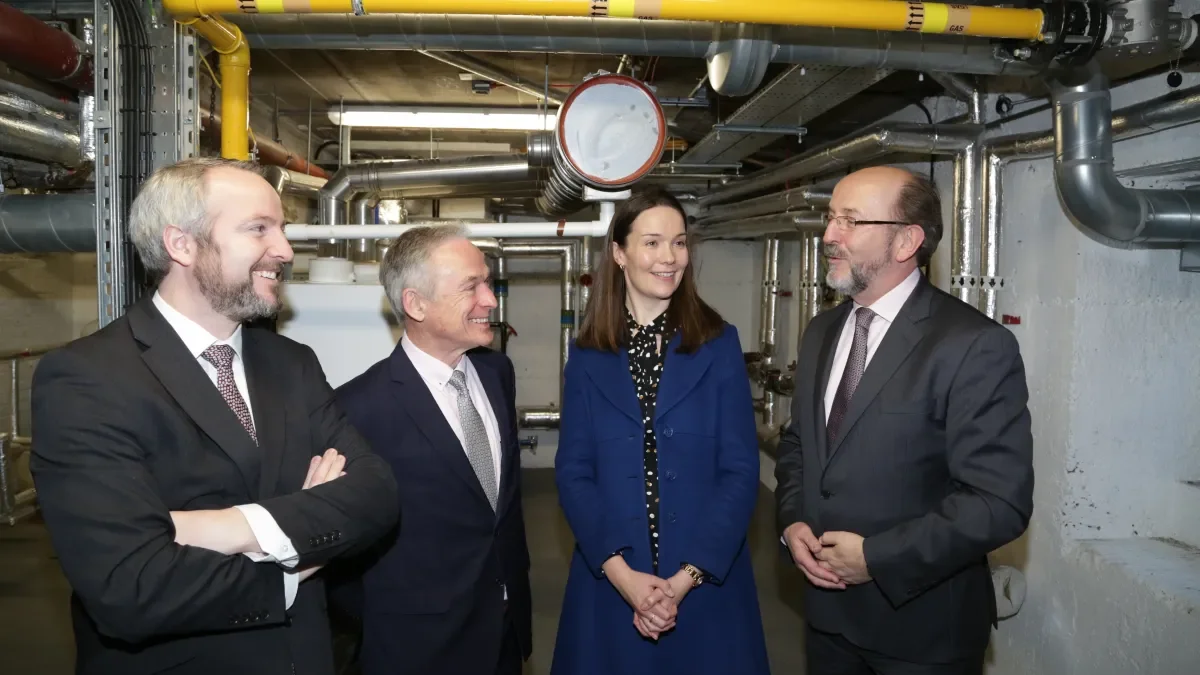

DCU praised for energy efficiency as Minister Bruton publishes SEAI report
The Minister for Communications, Climate Action and the Environment, Mr. Richard Bruton T.D. today published a report by Sustainable Energy Authority of Ireland (SEAI) on the energy efficiency of all public bodies.
The report evaluated 331 public bodies and 2,279 schools, representing an annual energy spend of €608 million. The report shows that public sector bodies collectively saved €191 million and 667,000 tonnes of avoided CO2 emissions in 2017.
Since 2009, public sector bodies have made over €1 billion in energy savings and avoided 3.6 million tonnes of CO2 emissions. These savings have made the public sector 24% more efficient in energy use overall since 2009, putting it on course to achieve the 33% energy efficiency target by 2020.
Minister Bruton said:
This is a significant achievement – but it can be further improved. While some bodies are doing very well, the range of performance varies across public bodies. Of the 34 bodies who use greater than 50 EWH per year, 11 have achieved savings of over 30%, but some have not yet even achieved 10%. Further significant progress could be made if health, some areas of education and commercial state bodies further improved performance and reached their target of 200KT CO2 saved per year.
We have a national Strategy to encourage and support Public Sector bodies in achieving their goals and SEAI are working with my Department to make guidance and support available to assist public bodies – it’s crucial all Departments and bodies engage pro-actively in this process.
If we want Ireland to become a leader in responding to climate change, it is important that we lead by example and that all of the public sector steps up to the challenge. Going forward, we must require every public body to display it’s DEC (equivalent to BER) rating. We need to set a new target that is more ambitious than the current 33% by 2020 set. We need to create a stronger mandate in all our public bodies to step up their focus on climate action.
SEAI CEO Jim Gannon said:
For nearly fifteen years, SEAI has provided tools, training and advice to deliver measurable cost reductions and carbon savings in public sector organisations. This includes identifying opportunities, supporting delivery of capital projects, capacity building and best practice sharing. We continue to provide tailored supports, in partnership with ambitious public sector organisations who demonstrate a commitment to strategic energy management. As we now turn towards 2030, we must accelerate activity in the public sector, and seek cost effective ways of achieving even greater results.
Dublin City University achieved primary energy savings of over 2.8 GWh in 2017 compared to 2016, in addition to gaining ISO 50001 energy management certification and launching a plan to develop a Carbon Neutral Exemplar Campus. New high efficiency boilers were installed in All Hallows Campus delivering 59% more savings than predicted. An upgrade of the existing internal and external lighting in the multi-storey carpark to LEDs, together with occupancy and daylight sensors, have also exceeded predicted savings by 19%.
Professor Brian MacCraith, President of DCU, said:
We are very proud of the energy efficiencies that have been achieved here at DCU and, as a key public sector entity with a 20,000-strong community, we are keen to continue leading by example. The University places sustainability as a core element of our Strategic Plan and achieving continuous improvements in energy efficiency is a central pillar of that strategy. I am confident that, through a sustained and multi-faceted approach of investment, awareness-building and modifications to daily habits on energy usage, we can continue to surpass our targets.
In 2017 SEAI delivered a number of partnerships in the public sector aimed at removing barriers, demonstrating best practice, and building scale in energy efficiency investment. Ten schools received medium to deep energy retrofits in a partnership with Department of Education and Skills and twelve central government buildings were retrofitted in a partnership with OPW. The total capital cost of the pilots was €8m, delivering over 4GWh (primary energy) and €250,000 energy savings
A full copy of the report is available at www.seai.ie
About the SEAI Report
This is the fifth annual report on the energy efficiency performance of public bodies in Ireland. It is set in the context of Ireland’s EU and national commitments and wider climate change goals, whereby a target of 33% energy efficiency improvement is to be achieved by all Irish public bodies (as defined in SI 426 of 20141) by 2020. The public sector target is an exemplary target of 33%, whereas the national target is 20%.
Public bodies are required to report annual energy efficiency data to the Sustainable Energy Authority of Ireland (SEAI) which manages the reporting process on behalf of the Department of Communications, Climate Action and Environment (DCCAE). Approximately 94% of all public bodies are now using the online national energy monitoring and reporting system established by SEAI and DCCAE, in addition to 62% of all schools. The monitoring and reporting system provides an important record of how the public sector performed in 2017.
Photo (Left-right): Jim Gannon, CEO SEAI; Richard Bruton TD, Minister for Communications, Climate Action and the Environment; Maria Galavan, SEAI; and Prof. Brian MacCraith, President of DCU, inspecting energy monitoring at DCU's All Hallows campus.
